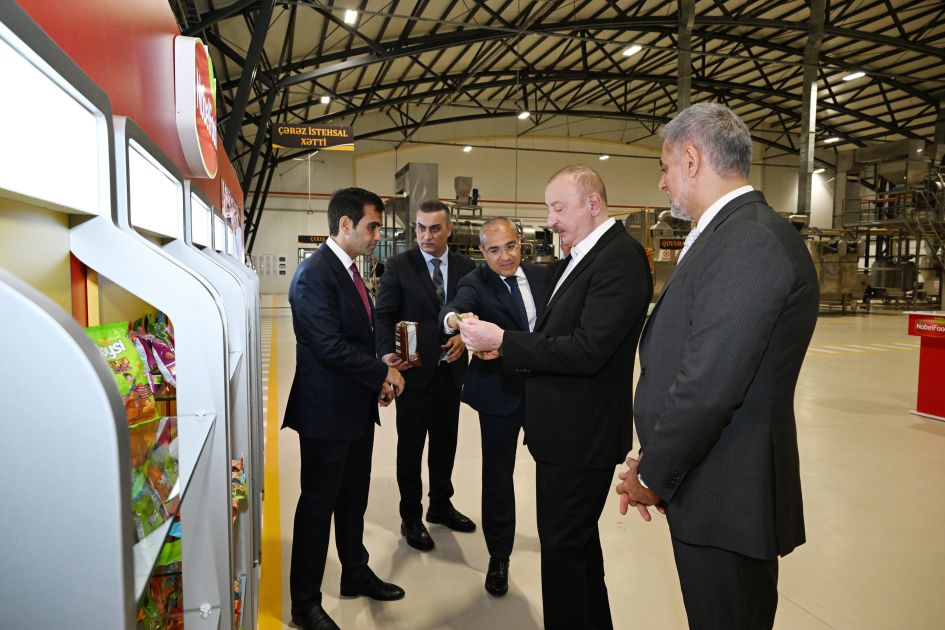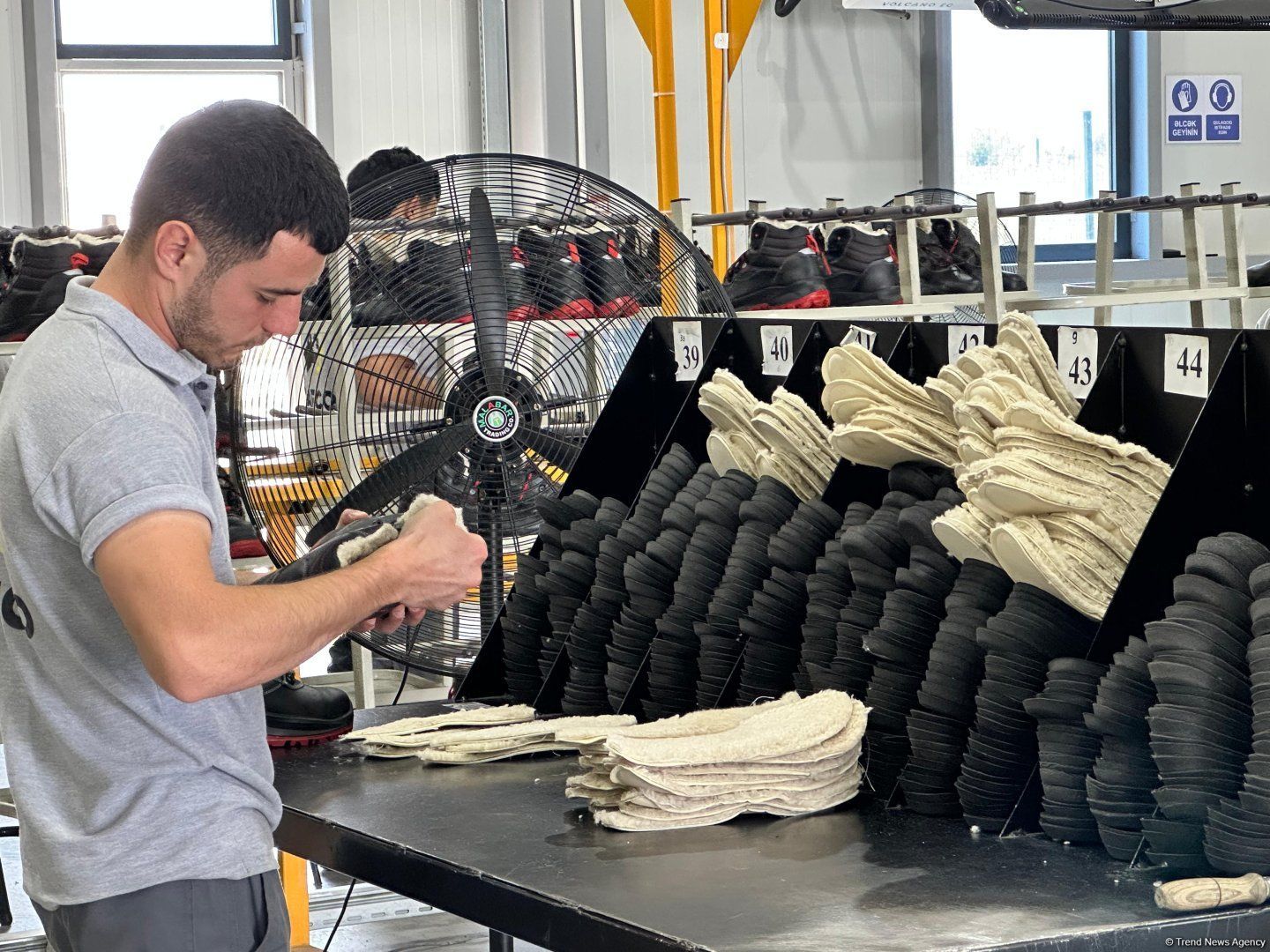|
|
TODAY.AZ / Analytics
Azerbaijan builds non-oil future with bold industrial moves
13 June 2025 [08:30] - TODAY.AZ

As part of its long-term strategy to diversify its economy and reduce dependence on hydrocarbon revenues, Azerbaijan is taking bold steps to expand and modernize its non-oil sectors. Two recent developments— the inauguration of a large-scale snack production facility in Baku and the rapid industrialization of the Aghdam Industrial Park—demonstrate the country's commitment to industrial innovation, regional revitalization, and inclusive economic growth.
The newly inaugurated Nobel Food Industry LLC snack plant, co-founded by the Gafgaz Canning (a subsidiary of Azersun Holding) and Shervan LLC, represents a key milestone in Azerbaijan’s efforts to expand domestic production and develop export-oriented manufacturing. With an annual production capacity of 9,600 tons and state-of-the-art equipment sourced from global leaders, the facility aims to serve both local and international markets, thus reinforcing the "Made in Azerbaijan" export initiative.

Expanding exports offers Azerbaijan several strategic advantages. First, it diversifies foreign exchange earnings, making the economy less vulnerable to oil price fluctuations. Second, it enhances the competitiveness of local enterprises by integrating them into global value chains, promoting innovation, and encouraging higher standards of production. Finally, a robust export sector improves trade balances and strengthens the national currency.
A distinctive feature of this enterprise is its reliance on local raw materials such as sunflower seeds, almonds, and hazelnuts. This vertical integration creates a synergistic relationship between industry and agriculture, ensuring steady demand for domestic produce, encouraging the cultivation of high-value crops, and promoting rural development.
The agricultural sector, which employs a significant portion of the Azerbaijani population, stands to benefit through increased incomes, technology transfer, and modernization. In the long term, such industrial-agricultural linkages foster the creation of resilient, value-added supply chains, reduce import dependency, and contribute to food security.

With 210 permanent jobs created, the snack plant directly contributes to reducing unemployment and supporting household incomes. This is particularly vital in addressing urban employment and stabilizing labor markets amid global economic volatility. Moreover, employment in technologically advanced facilities promotes skills development, laying the groundwork for a more competitive and innovation-ready workforce.
The total investment of ?38 million, including a ?5 million preferential loan from the Azerbaijan Business Development Fund (ABDF), highlights the importance of targeted financial instruments in mobilizing private sector participation. By offering concessional loans, ABDF helps lower the cost of capital for businesses, de-risking investments and enabling broader participation in national development.
Aghdam Industrial Park: Engine of post-conflict economic revitalization
In parallel with industrial growth in Baku, Azerbaijan is also making rapid progress in reconstructing and economically reactivating its liberated territories, with Aghdam Industrial Park emerging as a central platform for this transformation. In just Q1 2025, the park reported ?63 million in output, and since its inception in September 2024, total production has reached ?85 million.
The successful operation of enterprises such as Bafco Invest LLC, which exports high-tech footwear to Kazakhstan, showcases the region’s growing role as an export and manufacturing hub. By using advanced German Desma equipment and focusing on quality, these firms demonstrate the country’s ability to compete in regional and international markets, even from newly revitalized regions.
Aghdam Industrial Park offers a comprehensive package of tax and customs exemptions—including 10-year exemptions on property, land, and income taxes, as well as full VAT and customs exemptions for imported equipment. These incentives significantly reduce entry barriers, encourage capital inflows, and promote technological upgrading. As of June 2025, ?8 million in exemptions have been granted, validating the effectiveness of this policy in attracting investors.

The upcoming tobacco manufacturing facility, backed by ?115 million in private investment and expected to employ 653 people, exemplifies the scale and ambition of post-conflict economic reconstruction. Such anchor projects have strong multiplier effects: they stimulate local supplier networks, drive infrastructure development, and generate substantial tax revenues.
These industrial investments are not isolated initiatives but part of a deliberate structural shift in Azerbaijan’s economic model. By prioritizing sectors such as manufacturing, food processing, and agro-industry, the country is laying the foundation for a resilient and diversified economy capable of withstanding global shocks.
The integrated approach—linking state support mechanisms, such as ABDF financing, with targeted incentives, export promotion, and public-private partnerships—demonstrates a sophisticated policy architecture. This not only accelerates industrialization but also enhances regional equity, as growth is increasingly spread across Baku and formerly underdeveloped regions.
The launch of the Nobel snack production plant and the rapid evolution of Aghdam Industrial Park underscore Azerbaijan’s progress in reshaping its economic identity. By investing in high-value industries, supporting local agriculture, and rebuilding liberated territories, the country is advancing toward a more competitive, inclusive, and globally integrated non-oil economy.
These initiatives are also critical in achieving national development goals, such as reducing unemployment, boosting exports, enhancing food security, and building a robust middle class. As Azerbaijan continues to pursue innovation-driven growth, these strategic projects will serve as key pillars of its long-term vision for economic resilience and sustainable prosperity.
URL: http://www.today.az/news/analytics/259835.html
 Print version
Print version
Connect with us. Get latest news and updates.
See Also
- 03 December 2025 [19:50]
Baku’s strategic patience ends Minsk Group era, rewrites regional power dynamics - 01 December 2025 [13:58]
Baku positions itself as regional digital hub through WTDC-25 - 29 November 2025 [08:30]
Banking sector strengthens as capital, credit and digitalization advance - 28 November 2025 [08:30]
President Aliyev places industry and innovation at centre of economic reform - 26 November 2025 [08:30]
Caspian energy faces turning point as Azerbaijan sets course beyond oil dependence - 25 November 2025 [08:30]
World Bank study highlights path for Azerbaijan’s shift to non-oil economy - 23 November 2025 [16:19]
Armenia faces its moment of truth on constitutional reform - 22 November 2025 [20:15]
Why Trump’s proposal deserves more sober assessment - 22 November 2025 [08:30]
COP29 achieves worldwide recognition for its breakthrough climate outcomes - 21 November 2025 [17:16]
Azerbaijan strengthens multilateral engagement as Baku hosts D-8 Media Forum
Most Popular
 The Trans-Caspian gas pipeline is coming back: and who will pay?
The Trans-Caspian gas pipeline is coming back: and who will pay?
 Azerbaijan, China central banks explore closer cooperation
Azerbaijan, China central banks explore closer cooperation
 Homecoming: five years since the liberation of the Lachin district
Homecoming: five years since the liberation of the Lachin district
 OSCE officially closes Minsk process following joint appeal by Azerbaijan and Armenia
OSCE officially closes Minsk process following joint appeal by Azerbaijan and Armenia
 Lukashenko’s low-profile Oman trip fuels disappearance rumors
Lukashenko’s low-profile Oman trip fuels disappearance rumors
 Baku to host int'l conference on 'Developing Artificial Intelligence Index in Islamic World'
Baku to host int'l conference on 'Developing Artificial Intelligence Index in Islamic World'
 Azerbaijan, Uzbekistan forge partnership for education and research
Azerbaijan, Uzbekistan forge partnership for education and research
